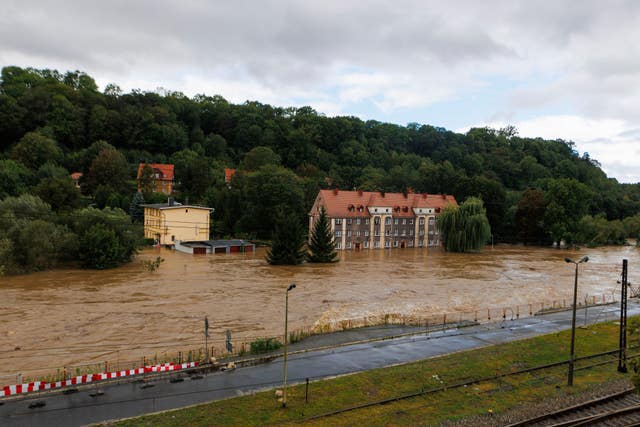Deadly flooding kills at least 16 people in Central Europe
The floods have already killed seven people in Romania and one in Austria.

Heavy flooding has pounded Central Europe, killing several people in Poland and the Czech Republic.
Following an emergency government meeting, Prime Minister Donald Tusk announced a state of natural disaster in the flooded areas to facilitate evacuation and rescue operations, as well as expedite financial support for the victims.
Mr Tusk told a news conference that the Finance Ministry has so far earmarked one billion zlotys (£197,000) for immediate payouts.

Schools and offices in the affected areas were closed on Monday and drinking water and food were being delivered by trucks.
Many Polish cities, including Warsaw, have called for food donations for flood survivors.
Experts are warning of a flood threat in Opole, a city of some 130,000 residents, where the Oder River has reached high levels and started bursting its banks at some points.
Concerns have also been raised in the city of Wroclaw, home to about 640,000 residents, where the flooding was expected on Wednesday.
The city suffered a disastrous flood in 1997 and the trauma is still present there.
The number of flood victims in southwestern Poland rose to five after the body of a surgeon returning from hospital duty was found in the town of Nysa on Monday morning, firefighters said.
Earlier, the bodies of two women and two men were found in the towns of Bielsko-Biala and Ladek-Zdroj, and in two villages.

Seven other people were missing on Monday, up from four a day earlier.
The floods have already killed seven people in Romania and one in Austria.
Czech authorities declared a state of emergency in two northeastern regions, which have seen the worst flooding, including in the Jeseniky mountains near the Polish border.
A number of towns and cities were submerged on Sunday in the north east, with thousands evacuated.
Military helicopters joined rescuers on boats in efforts to transport people to safety.
Waters were receding from the mountainous areas on Monday, leaving behind destroyed houses and bridges and damaged roads.
In most parts of the country, conditions were expected to improve on Monday.

Firefighters and others were working to fix the problem.
Authorities in Ostrava, the country’s third-largest city, warned against travelling there.
Most people were without hot water and heating in the city.
Czech Prime Minister Petr Fiala visited the town of Jesenik, one of the hardest-hit places.
“The worst is behind us, and now we have to deal with all the damage,” Mr Fiala said following the visit.
After flooding hit Austria, the Czech Republic, Poland and Romania, it might impact Slovakia and Hungary next as a result of a low-pressure system from northern Italy that has been dumping record rainfall in the region since Thursday.
In Hungary, the mayor of Budapest warned residents that the largest floods in a decade were expected to hit the capital later in the week, with the waters of the Danube River set to breach the city’s lower quays by Tuesday morning.

“Until we reach the peak and get past the worst of it, I naturally won’t be leaving the country, I’ll be here at home,” he said.
Budapest mayor Gergely Karacsony wrote on Facebook that the city would use one million sandbags to bolster flood defences, and asked residents to take extra care when near the river.





